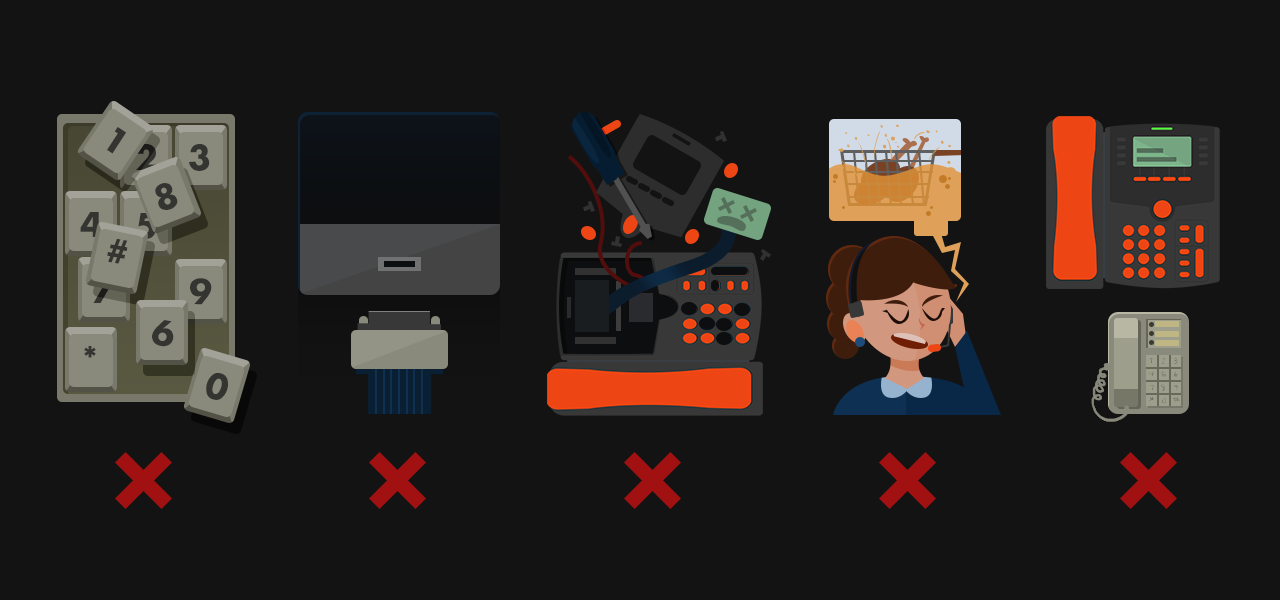5 Common Myths About VoIP (And Why They’re Wrong)
No, VoIP isn't as complicated as the name might suggest. In fact, those 4 daunting letters simply stand for "Voice over Internet Protocol".
This type of telephone system is not much different from what is now called "traditional telephony". IP phone systems allow you to make and receive calls the same way you do with a regular office phone but using the Internet instead of a wired network. This is probably why many users don't even realize they are using a VoIP phone line!
Unfortunately, there are still a few myths circulating about VoIP that discourage businesses from choosing it when they stand to benefit greatly from it. Here are five of them.
1 - Switching to VoIP means you have to change your phone number
Some organizations are reluctant to switch to VoIP for fear of depriving their customers of their usual means of contact: the company's phone number, which has probably remained the same since the company was founded.
Well, rest assured, VoIP phone system providers are well aware that building customer loyalty is difficult enough, so there's no need to make it even more challenging by changing the habits of your customers and business partners! If you switch to VoIP, you will be able to transfer your existing business numbers when you change service providers.
If you want to be sure of this, simply look for IP telephony providers that prioritize number forwarding during the technology migration process.
2 - Your current phone equipment is incompatible with VoIP
Replacing all phones can be a very significant investment for a company. This is one of the reasons why entrepreneurs are reluctant to switch to VoIP: they are afraid they will no longer be able to use their devices, even though the devices are still in good working order.
The beauty of VoIP is its ability to be integrated with the technology and devices you already own. Typically, this is done through a hybrid VoIP system or a hybrid PBX, which combines your existing telephone equipment with VoIP.
You should therefore ask your prospective VoIP provider whether you will be able to continue using your phones if you choose their services.
3 - A VoIP phone system is difficult to install and maintain
Computers, telecommunications and networks aren't everyone's cup of tea. As a result, many employees are concerned that they will be left to deal with complex technology that is difficult to implement and maintain.
And yet, VoIP is so simple that some providers can even provide you with step-by-step instructions on how to install it yourself. Of course, the providers usually come to install the system for you.
Modification and maintenance of the IP system is also simple. Unlike older technologies, Voice over IP allows users to easily move, add or change users, generally through a user-friendly online portal.
4 – VoIP phone systems have disappointing call quality
It is only normal that no one wants to invest in a new phone system only to find that the call quality is worse than before.
Admittedly, in the early days of VoIP, users sometimes complained about echoes, background noise and latency. Unlike traditional analog telephony, VoIP technology compresses voice data into "packets" that are then transmitted to their destination, decompressed and delivered. Since VoIP is Internet-based, the quality of calls was dependent on the quality of the broadband connections of the time.
However, the reliability and speed of Internet connections, and therefore VoIP technology, have improved significantly. Providers have identified the causes of poor call quality and have developed strategies to overcome them.
These strategies, commonly referred to as Quality of Service (QoS) protocols, assess disruptive factors such as jitter, latency and delay and ensure that a sufficient level of resources are mobilized to improve voice traffic.
5 - VoIP is only suitable for large companies
Many entrepreneurs have no interest in VoIP technology because they feel that it was designed solely for use by large organizations.
That's not true! VoIP offers as many advantages for small businesses as it does for large ones. In addition to saving small and medium-sized businesses money, a VoIP solution offers a host of useful features that help increase productivity and make it easier to compete with giants in any industry.
Have any other fears about VoIP? Let the UBIK team reassure you
In conclusion, it is perfectly normal to be uncertain about new technologies such as VoIP telephony (even though it is now over 40 years old!).
If you still have concerns about VoIP after reading this article, please do not hesitate to share them with the UBIK team. VoIP could very well be the ingredient that propels your business to new heights!






